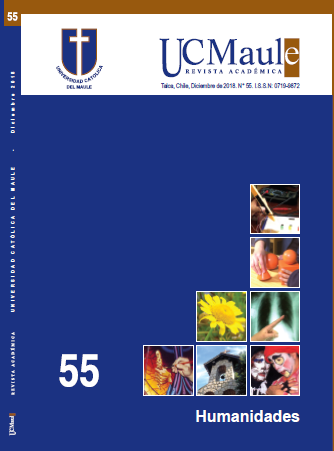Instrumentos de evaluación de la conducta adaptativa en personas con discapacidad intelectual Estado del arte
Contenido principal del artículo
Resumen
Información del artículo
Publicado:
Dec 1, 2018
Número:
Núm. 55 (2018): UCMaule
Sección:
Estudios
Palabras clave:
Conducta adaptativa, Discapacidad intelectual, Evaluación, Instrumentos de evaluación
Detalles del artículo
Cómo citar
Gutiérrez-Zuñiga, R. P., Paz Maldonado, E. J., Suazo Yáñez, D. F., & Rodríguez Retamal, M. J. (2018). Instrumentos de evaluación de la conducta adaptativa en personas con discapacidad intelectual: Estado del arte. UCMaule, 55, 9-32. https://doi.org/10.29035/ucmaule.55.9
Referencias
ASOCIACIÓN AMERICANA DE DISCAPACIDADES INTELECTUALES Y DEL DESARROLLO (AAIDD). (2011). Discapacidad Intelectual: Definición, Clasificación y Sistemas de Apoyo. Madrid, España: Alianza.
ALARCÓN-LEIVA, J., Y SEPÚLVEDA-DOTE, M. (2014). “Adaptative behavior as a diagnostic criterion of intellectual disability among students in Chile”. Revista Latinoamericana de Ciencias Sociales, Niñez y Juventud, 12(1), 187–199. Doi: http://doi.org/10.11600/1692715x.12110091713.
BALBONI, G., TASSÉ, M., SCHALOCK, R., BORTHWICK-DUFFY, S., SPREAT, S., THISSEN, D., WIDAMAN, K., ZHANG, D. Y NAVAS, P. (2014). “The Diagnostic Adaptive Behavior Scale: Evaluating its diagnostic sensitivity and specificity”. Research in Developmental Disabilities, 35(11), 2884–2893. Doi: http://doi.
org/10.1016/j.ridd.2014.07.032.
GARCÍA, I., DE LA FUENTE, R., Y FERNÁNDEZ, M. (2010). “Adaptation of de ABS-S: 2 for use in Spain with children with intellectual disabilities”. Journal of policy and practice in intellectual disabilities, 7(3), 221-230.
GUEVARA, R. (2016). “El estado del arte en la investigación: ¿análisis de los conocimientos acumulados o indagación por nuevos sentidos?” Folios, (44), 165-179. Recuperado de http://www.scielo.org.co/scielo.php?script=sci_ arttext&pid=S0123-48702016000200011&lng=en&tlng.
LAGOS, J., Y AMARO M. (2016). “La evaluación de la conducta adaptativa en la primera infancia: una discusión pendiente”. Boletín Redipe, 5(5), 43-57.
MAKARY, A., TESTA, R., TONGE, B., EINFELD, S., MOHR, C., Y GRAY, K. (2015). “Association between adaptive behaviour and age in adults with Down syndrome without dementia: Examining the rangeand severity of adaptive behaviour problems”. Journal of Intellectual Disability Research, 59(8),689–702. Doi:http://doi.org/10.1111/jir.12172.
MCKENZIE, K., Y MURRAY, A. (2014). “The convergent validity of the Child and Adolescent Intellectual Disability Screening Questionnaire with a measure of adaptive functioning: A brief report”. Journal of Intellectual and Developmental Disability 39(1), 98–101.
MEDINA-GÓMEZ, B., Y GARCÍA-ALONSO, I. (2011). “La evaluación de la conducta adaptativa con la escala ABS-RC: 2”. International journal of developmental and educational psychology, 1(1), 341-351.
MONTERO, D. (2005). La conducta adaptativa en el panorama científico y profesional actual. Psychosocial Intervention, 14 (3), 277-293.
MONTERO, D., Y LAGOS, J. (2011). “Conducta adaptativa y discapacidad intelectual: 50 años de historia y su incipiente desarrollo en la educación en Chile”. Estudios pedagógicos, 37(2), 345-361. Doi: https://dx.doi.org/10.4067/S0718-07052011000200021.
MUÑOZ-QUEZADA, M., Y LUCERO MONDACA, B. (2017). “Evaluación de procedimientos para el diagnóstico de discapacidad intelectual en estudiantes con discapacidades múltiples”. Revista Ajayu de Psicología, 15(1), 34-52.
PERRY, A., TAHERI, A., TING, V., Y WEISS, J. (2015). “The GO4KIDDS Brief Adaptive Scale”. Journal of Applied Research in Intellectual Disabilities, 28(6), 594–597. Doi: http://doi.org/10.1111/jar.12143.
SANTOS, S., MORATO, P., Y LUCKASSON, R. (2014). “Psychometric properties of the Portuguese version of the Adaptive Behavior Scale”. Intellectual and developmental disabilities, 52(5), 379-387. Doi: https://doi.org/10.1352/1934-9556-52.5.379.
SCHALOCK, R. L., Y VERDUGO, M. Á. (2007). “El concepto de calidad de vida en los servicios y apoyos para personas con discapacidad intelectual”. Siglo Cero, 38(4), 21-36.
SCHALOCK, R. (2009). “La nueva definición de discapacidad intelectual, apoyos individuales resultados personales”. Siglo Cero, 40(1), 22-39.
SCHALOCK, R., BORTHWICK-DUFFY, S., BRADLEY, V., BUNTIX, V., COULTER, M., CRAIG, E., GÓMEZ, S., LACHAPELLE, Y., LUCKASSON, R., REEVE, A., SHOGREN, K., SNELL, M., SPREAT, S., TASSÉ, M., THOMPSON, J., VERDUGO, M., WEHMEYER, M., Y YEAGER, M. (2010). Intellectual Disability: Definition, Classification, and systems of supports (11 ed.). Washington, DC: American Association of Intellectual and Developmental Disabilities.
TASSÉ, M., SCHALOCK, R., THISSEN, D., BALBONI, G., BERSANI, H., BORTHWICK-DUFFY, S., SPREAT, S., WIDAMAN, K., ZHANG, D., Y NAVAS, P. (2016a). “Development and standardization of the diagnostic adaptive behavior scale: Application of item response theory to the assessment of adaptive behavior”. American Journal on Intellectual and Developmental Disabilities, 121(2), 79–94. Doi: https://doi.org/10.1352/1944-7558-121.2.79.
TASSÉ, M., SCHALOCK, R., BALBONI, G., SPREAT, S., Y NAVAS, P. (2016b). “Validity and reliability of the Diagnostic Adaptive Behaviour Scale”. Journal of Intellectual Disability Research, 60(1), 80–88. Doi: http://doi.org/10.1111/jir.12239.
VERDUGO, M., NAVAS, P., JORDÁN DE URRÍES, F., GÓMEZ, L., Y ARIAS, B. (2012). “Evaluación de la conducta adaptativa en el contexto español”. Comportamento adaptativo, dez anos depois, 35-54.
VERDUGO ALONSO, M., AMOR GONZÁLEZ, A., FERNÁNDEZ SÁNCHEZ, M., NAVAS MACHO, P., Y CALVO ÁLVAREZ, I. (2018). “La regulación de la inclusión educativa del alumnado con discapacidad intelectual: una reforma pendiente”. Siglo Cero, 49(2), 27-58. Doi: http://dx.doi.org/10.14201/scero20184922758.
Estadísticas de descarga
Download data is not yet available.
Información de la licencia

Esta obra está bajo una licencia de Creative Commons Reconocimiento-NoComercial-CompartirIgual 4.0 Internacional

